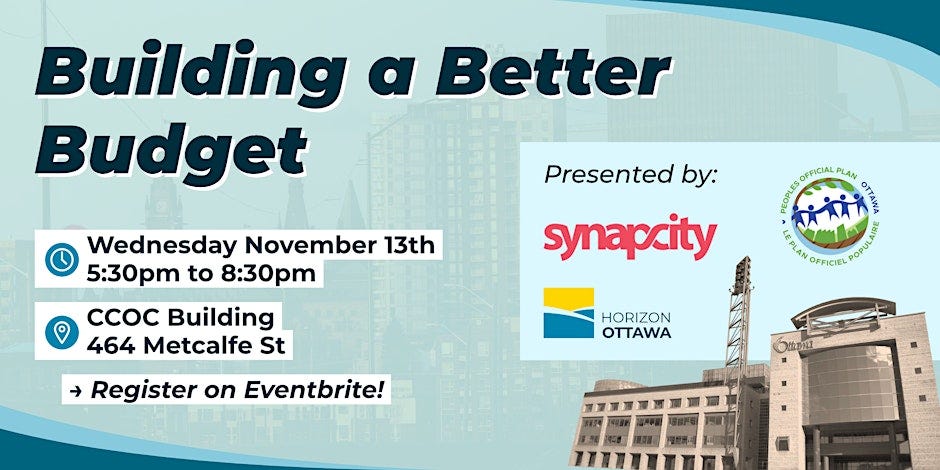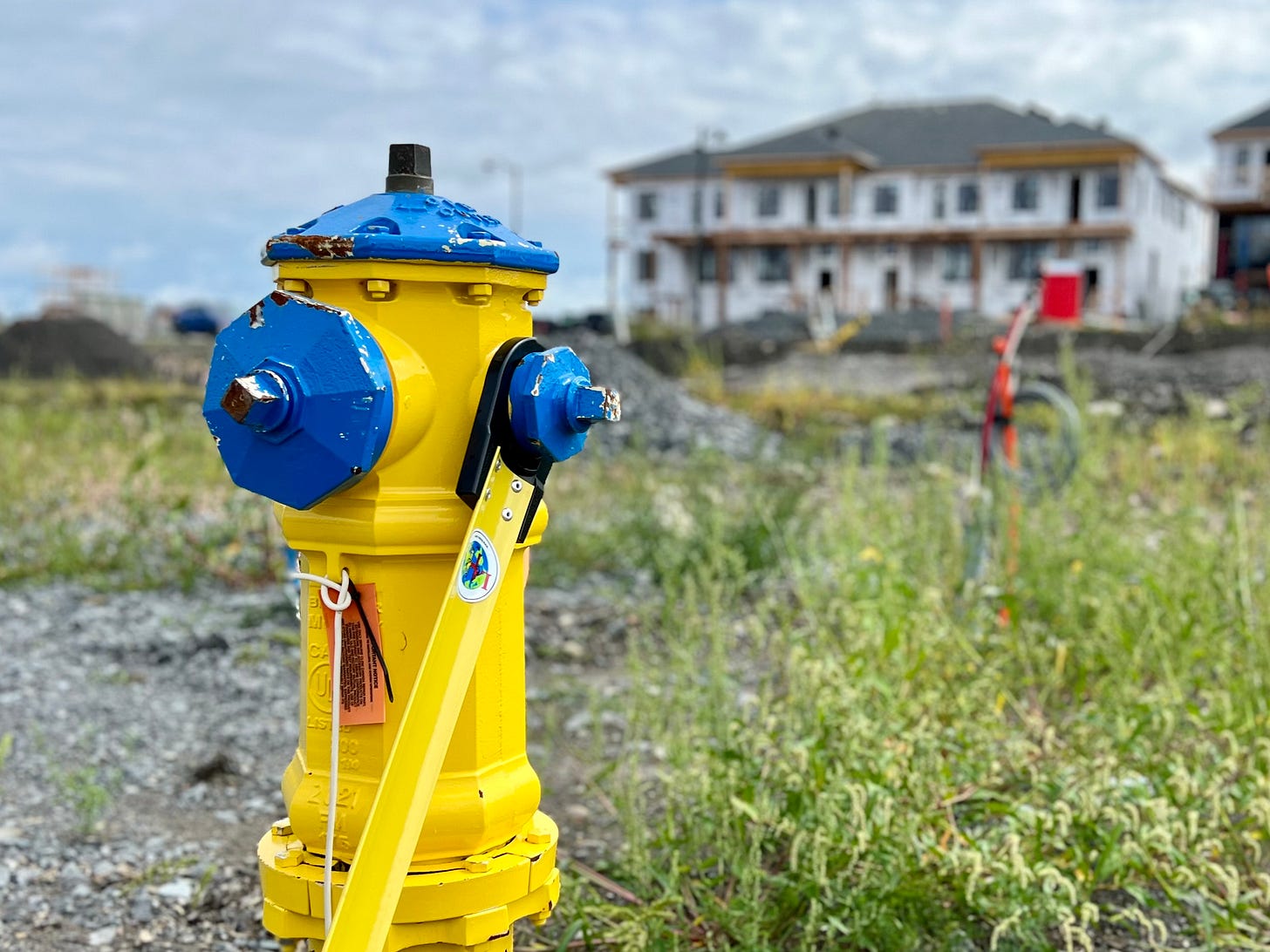What I'm Looking For in Ottawa's 2025 Budget (Part 2)
Poor infrastructure decisions made today could keep taxes high for generations to come.
I’m speaking at Synapcity’s Building a Better Budget event this Wednesday, 13 November at 6pm, with my first impressions of Ottawa’s 2025 budget. Hope you can join me.
Last week, I posted my top 4 questions for the upcoming 2025 Budget.
Can anyone even understand this budget?
What is the actual property tax increase?
How are we helping residents with affordability?
Are we fixing transit, or turning it into a costly white elephant?
The budget comes out this Wednesday, November 13, and gets approved on December 11.
I’m following up today with 4 questions specific to the capital budget.
1. Can we afford to build new infrastructure?
Ottawa has a lot of roads, water pipes and other infrastructure — such as hockey arenas, fire stations and landfills. We have $73 billion in existing infrastructure.
Most of that was built decades ago. At some point it is going to need to be repaired or replaced.
The city puts away a little every year to pay for that eventual replacement. But not enough.
Earlier this year, the City reported on the 10-year renewal costs of “other” infrastructure — everything other than roads, bridges and water pipes — and found that it had a $3 billion deficit. In other words, we are $3 billion short over the next decade to keep “other” infrastructure up to its current levels.
With a deficit, one option is to defer maintenance. But when we do that, it only gets more expensive to replace later. And we risk catastrophes, like the bursting water mains in Montreal and Calgary earlier this year.
That $3 billion deficit is a big hole. But there is an even bigger issue.
“Other” only accounts for 20% of total infrastructure. 80% of our infrastructure is for roads, bridges and water pipes — and we don’t even know how big that hole is.
In 2025, we’ll find out the 10-year deficit on renewing roads, bridges and water pipes.
Toronto found it has a $26 billion deficit over the next ten years to pay for the renewal of all its infrastructure.
That suggests Ottawa might be sitting on a $10 billion deficit for renewing all types of infrastructure over the next decade.
Will the 2025 budget say anything about how we are financing the $3 billion deficit for “other” infrastructure?
Or more fundamentally, if our total 10-year infrastructure renewal deficit turns out to be closer to $10 billion, can we really afford to build any new infrastructure at all?
Will the 2025 budget acknowledge the enormous liabilities we already have with our existing infrastructure?
And for all the new infrastructure proposed for next year, will the budget put a cost and timeline on when that will need to be replaced?
2. How much are we spending to widen roads?
A related issue is how much are we spending to widen roads. Currently, the City has plans for $881 million in road widenings, as per the table below from the City’s 19 July 2024 Development Charges Background Study.
We widen roads either because of neighbourhood growth, or to accommodate future growth in further-out neighbourhoods.
For example, the $68 million plan to turn the 2-lane Airport Parkway into a 4-lane road will have a minor benefit for existing commuters heading south. Only 6% of the cost is considered “Benefit to Existing”. 94% of the cost is for new growth. Presumably, this means new homes around areas like Findlay Creek.
But to the earlier point, can we really afford the infrastructure costs of more urban expansion, and its inevitable replacement?
How much will the 2025 budget provide for road widenings?
It is time that Ottawa budgets answered the question of what the future costs of this infrastructure will be, and when we need to maintain or replace it. That might give Councillors pause to think about whether we should be building new infrastructure, or making more efficient use of existing roads and pipes.
3. How will the City fill its affordable housing financing gap?
The City’s plan to build 500 affordable housing units a year is in a mess. Last week, Committee heard that we have fallen short, again, of meeting our annual target, although with the $176 million in federal Housing Accelerator Fund money that was secured earlier this year, we have completed a respectable 393 units so far in 2024.
Due to rising construction costs, we are now about $155 million a year short in meeting that 500 target. That puts us $931 million short over the next 6 years.
The City is appealing to the federal and provincial governments to fill the hole (although whether any formal request has yet been made is another issue).
Here’s a better idea for the 2025 budget. Take the $493 million that we have planned for Lansdowne stadium renovations, and use it to build affordable housing. That will show higher levels of government that we are serious and worthy of support.
4. What is the City doing to get market housing built, and not lose out on over $80 million a year in fed/prov money?
The City has already received half of its $176 million Housing Accelerator Fund money, but needs to meet its commitments to get a further $44 million in spring 2025 and $44 million in spring 2026.
Our commitment to the federal government is to permit 37,586 new homes between 31 January 2024 and 31 March 2027. The target for this year is to issue 12,500 new permits.
Ottawa can also access provincial funding for new homes built. The government of Ontario has set a target for Ottawa to start 12,583 new homes in 2024 in order to access Ontario’s Building Faster Fund. In 2023, Ottawa received $37 million in provincial money for breaking ground on just over 10,000 new homes.
In total, Ottawa could access over $80 million in federal and provincial money a year for the next two years if it meets its housing targets.
According to data from the Canadian Mortgage and Housing Corporation, Ottawa had just over 5,000 housing starts in the first 9 months of 2024. We’re underperforming compared to where we need to be to secure our Building Faster money. City staff think we are on track to meet the HAF target.
There are certain actions that the City can take to help mobilize more housing. We have a plan to accelerate office to residential conversions. We also are working to dispose of surplus municipal lands.
Will the budget include any resources to get these, or other, housing initiatives moving faster?
4 questions for the capital budget
To recap, I’d like to see the capital budget address 4 strategic questions:
for new infrastructure projects approved in Budget 2025, how much will they cost to maintain over their lifecycle and eventually replace? What impact will this have on future taxpayers?
how much are we spending to widen roads in 2025, and how much of this is to open up new greenfield sub-divisions at the edge of the urban boundary? How much of a subsidy will those future homes require from existing taxpayers?
how will the City fill its $931 million affordable housing gap? Will the budget redirect the $493 million in Lansdowne money to affordable housing?
what is the City doing to incentivize the building of market housing?
I’ve seen enough of city finances to know that we’re unlikely to get a budget that asks these key questions. But these are the questions that Councillors should be asking of the Mayor and staff in order to get a budget that is in the best long-term interests of Ottawa taxpayers.










Neil, in "Ottawa had just over 5,000 housing starts in the first 9 months of 2025" presumably you mean 2024.
And you're right, those questions will not be answered.
I read elsewhere that Ottawa is 50,000 homes short for the number of people who live here or will do so. Rather than asking can we afford new infrastructure, should we not ask, can we afford not to build new infrastructure.